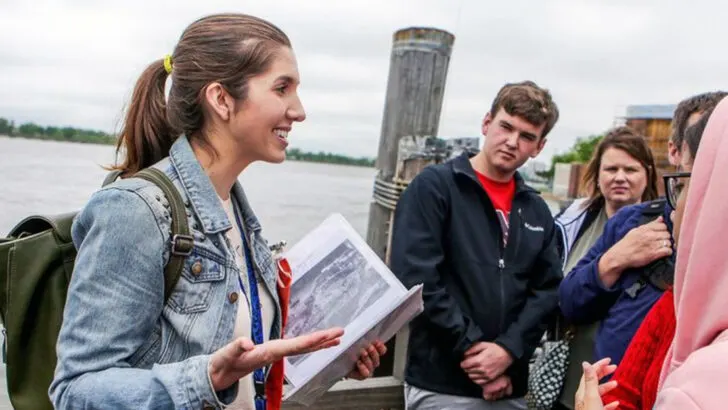Traveling can be an exciting adventure, but certain pitfalls can quickly label you as a tourist. Recognizing and avoiding these common mistakes can enhance your experience and help you blend in with the locals.
This guide explores 13 mistakes that are often made by travelers, offering insights and tips to avoid them.
Whether you are a seasoned traveler or embarking on your first journey, understanding these mistakes will ensure a smoother, more authentic travel experience. From dressing the part to understanding cultural nuances, these insights will help you travel like a local.
Wearing a Fanny Pack
Fanny packs are a dead giveaway when it comes to spotting tourists. Their bright colors and bulky appearance make them stand out in a crowd. Locals often use backpacks or stylish crossbody bags for convenience and security. Trading in your fanny pack for a more subtle bag can help you blend in.
Moreover, fanny packs are sometimes targeted by pickpockets, making them not only a fashion faux pas but a security risk as well. Consider investing in an anti-theft bag with hidden compartments for peace of mind and style.
Enhance your travel experience by dressing the part and thinking like a local.
Taking Too Many Photos
It’s easy to get caught up in the excitement of capturing every moment, but excessive photo-taking can mark you as an obvious tourist. Locals often enjoy the moment without the constant click of a camera.
Instead of snapping away, try immersing yourself in the scene. Observe the nuances, engage with the environment, and perhaps limit your photo-taking to a few meaningful shots.
Not only will this help you blend more seamlessly, but it also enhances your overall travel experience by fostering mindfulness and presence. Remember, some memories are best preserved in the heart, not just on film.
Dressing Inappropriately for Local Culture
Dressing in a way that doesn’t align with local customs can make you stand out as a tourist. In many cultures, modest clothing is not only a sign of respect but a common practice among locals.
Researching the dress code of your travel destination can save you from uncomfortable stares and allow you to engage more authentically. Whether it’s covering your shoulders or wearing longer skirts, small adjustments can make a big difference.
By embracing local fashion, you not only show respect but also immerse yourself in the cultural tapestry of the region, turning your travel experience into a more genuine adventure.
Relying on Guidebooks Too Much
Guidebooks can be a helpful resource, but over-reliance can limit your experience and brand you as a tourist. Locals rarely have their eyes glued to a book; instead, they engage with their surroundings.
Try exploring off the beaten path by asking locals for recommendations or simply wandering through less touristy areas. This approach often leads to unique discoveries that guidebooks might miss.
By stepping away from the page and into the world, you can create a more spontaneous and memorable journey. Embrace the unknown and let your curiosity guide you to unexpected delights.
Not Learning Basic Local Phrases
Language barriers can be challenging, but not knowing basic local phrases can hinder your travel experience. Simple greetings or thank-yous can open doors and create connections with locals.
Taking the time to learn a few key phrases not only shows respect but also enhances your interactions. It can lead to smiles, assistance, and even friendly conversations.
Even if you’re not fluent, locals appreciate the effort and often respond kindly. Bridging the language gap, even just a little, can transform your travel from a mere visit into a cultural exchange rich with warmth and understanding.
Overpacking
Overpacking is a common mistake that signals a lack of travel experience. Lugging around heavy bags not only slows you down but draws attention to your tourist status.
Experienced travelers know the value of packing light. A versatile wardrobe, along with efficient packing techniques, can make your journey smoother and more enjoyable.
By packing less, you gain freedom and flexibility, allowing you to navigate new environments with ease. Plus, it leaves room for souvenirs and local treasures you might discover along the way. Travel light, and watch your adventure unfold without the burden of excess baggage.
Not Trying Local Cuisine
Sticking to familiar foods can rob you of a rich culinary experience. Locals pride themselves on their cuisine, and trying new dishes can deepen your understanding of the culture.
While comfort foods have their place, stepping out of your culinary comfort zone is rewarding. It not only tantalizes your taste buds but also connects you to the cultural essence of the place.
Each region offers unique flavors waiting to be explored. Embrace local specialties, ask for recommendations, and savor the diverse palate. Your adventurous spirit will be your guide to unforgettable meals and memorable experiences.
Ignoring Local Customs and Etiquette
Overlooking cultural customs and etiquette can lead to misunderstandings and make you stand out as a tourist. Each culture has unique practices that are often deeply rooted in tradition.
Researching these customs before traveling can help you show respect and avoid awkward situations. Whether it’s learning how to greet someone or understanding dining etiquette, these small efforts can go a long way.
Embracing local customs enriches your travel experience and fosters goodwill. It transforms your journey from mere sightseeing to a meaningful cultural exchange that leaves a positive impression on both you and the locals.
Using Public Transportation Incorrectly
Public transportation is a great way to explore a new city, but fumbling with maps or boarding the wrong bus can highlight your tourist status. Locals navigate these systems with ease.
Familiarize yourself with the transportation options before you arrive. Apps, maps, and even asking locals can help you travel like a pro.
Mastering public transit not only saves time but also provides a glimpse into daily life. As you ride alongside locals, you gain insights into the rhythm of the city. Become part of the scene, and you’ll find yourself more connected to your destination.
Being Obvious with Valuables
Flashing valuables around is a sure way to attract unwanted attention. It not only marks you as a tourist but also makes you a potential target for theft.
Keep expensive items discreet and secure, using hidden pockets or money belts. This practice not only ensures your safety but also allows you to focus on the joy of travel rather than worries.
By blending in with locals and being mindful of your possessions, you can enjoy your journey with peace of mind. Embrace the experience without the burden of flashy items and let your adventures shine instead.
Not Respecting Quiet Zones
Loud conversations in quiet zones such as temples, libraries, or public transport can disrupt the tranquility and draw unwanted attention. Locals value these serene spaces and understand their purpose.
By observing the behavior of those around you, you can adapt and show respect. Keeping a low voice and being mindful of your surroundings helps you blend in seamlessly.
Respecting quiet zones not only honors local customs but also enhances your appreciation of the space. It allows you to soak in the peaceful atmosphere and connect with the setting on a deeper level.
Haggling Aggressively
Haggling is common in many cultures, but aggressive bargaining can create a negative impression. Locals often approach negotiations with a sense of respect and understanding.
Instead of pushing too hard, approach haggling with humor and politeness. Building rapport with vendors can lead to better deals and positive interactions.
Remember, the goal is not just to get the best price but to engage in a cultural tradition. By respecting this practice, you create a harmonious experience that leaves both you and the vendor with a smile.
Not Adapting to Local Time
Adjusting to a new time zone can be challenging, but not syncing with local time can signal your status as a tourist. Falling asleep in public or missing social cues disrupts your experience.
To minimize jet lag, gradually adjust your schedule before traveling. Once you arrive, embrace local routines by eating and sleeping according to the new time.
Adapting to local time enriches your travel experience, allowing you to participate fully in cultural activities. You’ll find yourself more energized and in tune with the vibrant life around you, making your journey both enjoyable and fulfilling.

